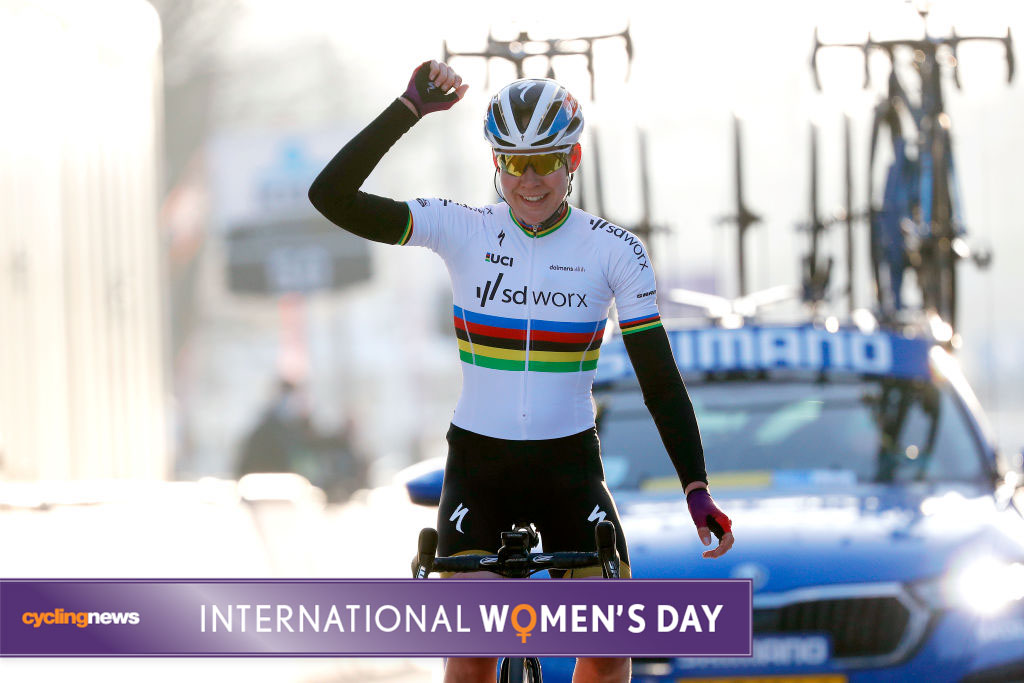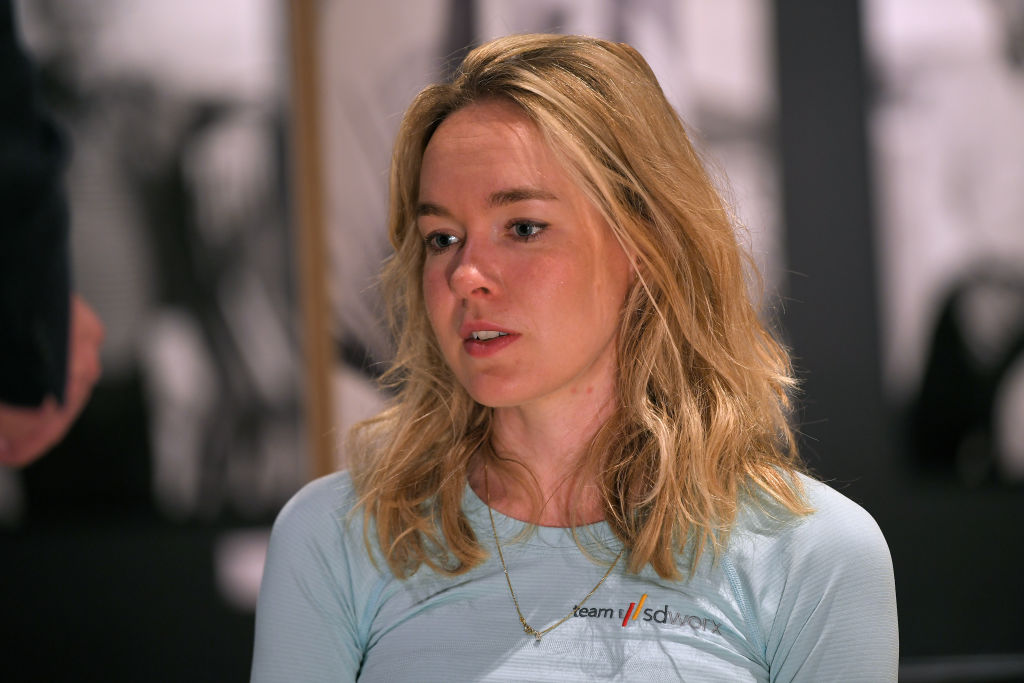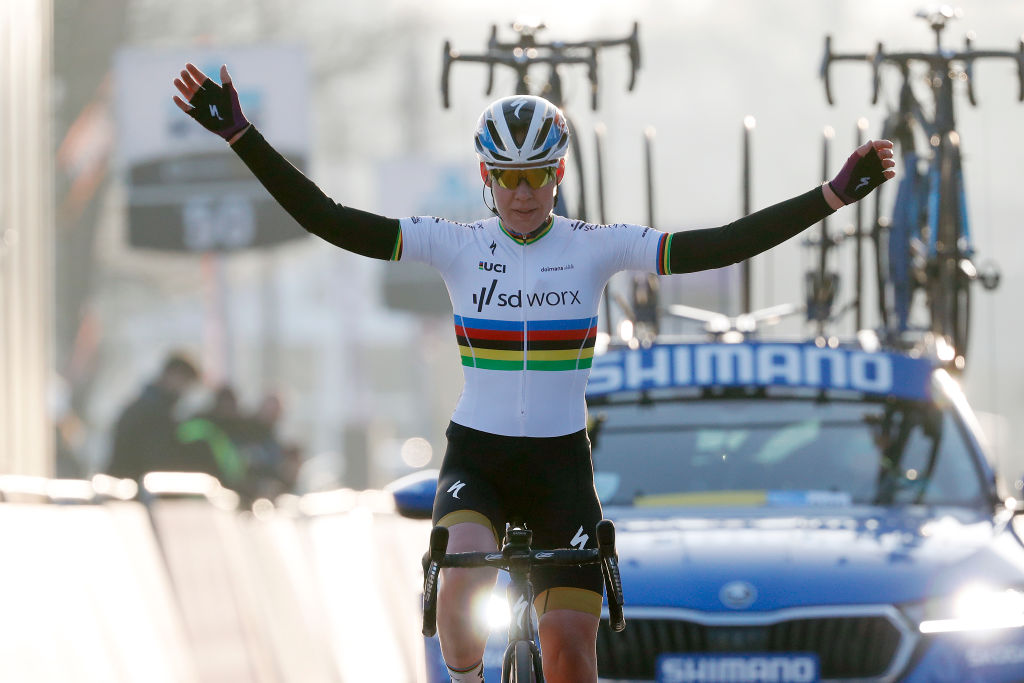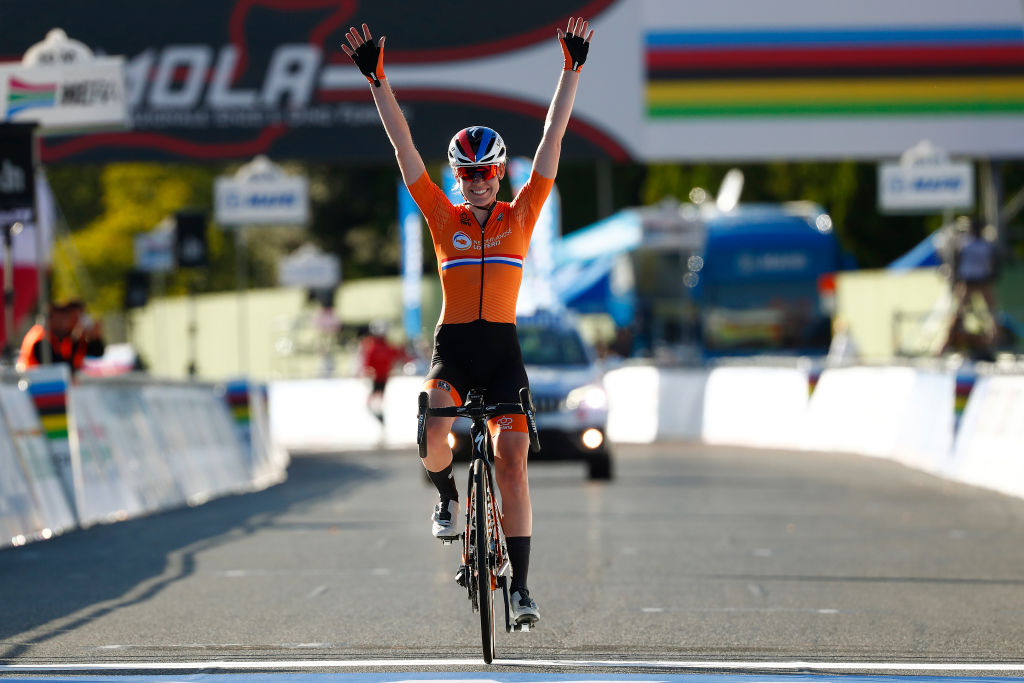Anna van der Breggen: Equality, starting a family, and retiring at her peak
Double world champion meets the press as a nominee for 2021 Laureus World Sportswoman of the Year Award

Cyclingnews' dedicated women's page features race reports, results, news, interviews, tech and galleries from the world of professional women's cycling.
Double world champion and Olympic Games gold medallist Anna van der Breggen (SD Worx) has been nominated for this year’s Laureus World Sportswoman of the Year Award, alongside other outstanding female athletes; tennis' Naomi Osaka, alpine skiing's Federica Brignone, athletics' Brigid Kosgei, football's Wendie Renard, and basketball's Breanna Stewart.
In a roundtable interview with members of the international press, Van der Breggen spoke about equality and becoming a spokesperson for women’s cycling, her desire to start a family, building future goals as a sports directeur, and her decision to retire from professional cycling while at the top of her game.
What are your emotions after learning that you’ve been nominated for the Laureus World Sportswoman of the Year Award?
Anna van der Breggen: It feels like a really big honour. I must say that I didn’t watch this award so many times, because it’s unknown for me, but looking through the list of award winners is really impressive. It’s always a big honour to have this nomination in a list of sport people like this, it’s pretty cool, and it’s special to have nominations from all sports around the world. It means a lot to me.
We saw last week at Omloop Het Nieuwsblad that there was a lot of talk about the prize money, and the difference between the prize money in the men’s race and the women’s race: €930 versus €16,000. Does it hurt you as riders when you see those numbers and discrepancies?
AvdB: Normally, I don’t see the numbers, but it’s just because it’s on social media now everywhere, that we see the numbers. It’s something that we are used to, and it’s been like this for 10 years or more. I think that it’s not something we should focus on because we are already really happy that the race was there and the organisers made the race happen. I truly believe that they try their best to arrange more and more for women’s cycling, like there was live broadcast this year, and I think we should see that as a victory, and not only focus on what’s not right. Of course, there is a difference [in prize money] and that is strange, but it’s not something which is the main point to focus on. If we keep on developing like we are doing now, there is more progress, and this point will change soon.
Get The Leadout Newsletter
The latest race content, interviews, features, reviews and expert buying guides, direct to your inbox!
We as journalists need to find a balance between writing about the sporting action and writing about the story and politics around it. Where is that balance?
AvdB: It’s great that [journalists] do it and there is attention for it because in other years there was not. That is a good point that people can see [prize money] is not equal. It never was equal but now people can see it, and notice, and that this point gives the idea that there is development, and that is a good thing. It is not only about pointing to the organisers and saying 'this is not fair, why are you doing this?' There is a lot behind it and many other problems to organise races. It is good that there is attention for it, but it needs to also be with respect for the organisers and for the people who try to make it better.
Even in women’s cycling, a lot of the top management are male, so how important is it for more women to have roles in team management and as directeurs?
AvdB: I think it doesn’t matter if they are male or female, it’s about a feeling I had, that I wanted to do this and I know exactly what the sport is. I’m always in it, and it doesn’t matter if you are male of female. It matters what you say and how good you are at being a sports directeur. I think that I am in the right place as a sports directeur and at least I am going to try. I think it’s focussed on, that there aren’t a lot of female sports directeurs, but for me, it feels like a natural step, and maybe in the future there are more [women] who are doing the same. I don’t want to focus too much on this point but there needs to be quality in women’s cycling and people who want to go in it, and that is the main point.
We’ve seen Cherie Pridham move into the men’s WorldTour with Israel Start-up Nation. What are your thoughts in terms of the doors that are opening and what that says about the sport?
AvdB: Why is it so special because she is a woman? We also know things about cycling, which is strange for some people, apparently. You have women and men who are good at it. It’s strange that the guys teams don’t have more women because we are good in different things. We also need to have male directeurs in women’s cycling. We have different qualities. In racing, the best team is all-round, we need different people, and that’s for the organisation and staff around the team. You need different kinds of people; some are good with social parts, some are good with technical parts, when you find these people, for sure you will have males and females. That makes sense, right?

Is it odd that you are [retiring] now just as so much [progress] is happening in women’s cycling?
AvdB: I think it’s interesting to see how fast it is going at the moment, with all the changes, new races and new rules. As an athlete, it’s separated from your own wishes and your own path as an athlete. I’m really happy that I can stay in women’s cycling because at the moment it is really interesting. I will try to make it even better. If I want to have a different job, I would leave totally, which would feel strange because you’ve done it for so many years, and then you stop as an athlete. It’s a personal story, to quit.
If you win the World Championships again in September and you have the rainbow jersey for another year, there would be no second thoughts about going on for another year?
AvdB: Never say never, but no, I don’t think so. It’s nice to have a really good last year, and to know that it’s my last year, and to look forward to being a sports directeur. You can be a world champion as a sports directeur.
How are you approaching your last season, mentally and emotionally?
AvdB: In the race, you do what you do anyway and that is not really different. Sometimes you have moments where you say, 'it’s going to be the last time that I will do this.' For example, in the spring, I had my last training camp in Spain, and I did my last training there, and I felt like it will be my last time training here, which I have done for so many years. There are some moments that feel strange, but on the other hand, it’s also nice to know that this is my final year and I have something different. It’s not a negative thing.
What is your secret for staying ahead of the competition all these years and what was the key moment that made you decided, 'that’s it, I’m done with racing, I’m retiring?'
AvdB: Every athlete tries to do their best. It’s difficult to say why some are better than others; it’s about talent, training, I don’t know. After so many years, I had the feeling, what motivated me is having new goals and doing something that I didn’t experience. Last year (and this year) was special because the Olympics were in it, and that really motivates me, and the whole winter training goes well because you have this one goal in mind. If you don’t feel that anymore, if I don’t feel motivation to win something than I wouldn’t be as good. That was the first thoughts, 'how long can I do it and how long can I keep myself motivated, like before, to be the best cyclist?' Now, I’m looking forward to knew things. It comes naturally, to feel at one point, 'OK, I think this is the moment to do something different and to quit cycling.'
How big of a role does wanting to start a family play in your decision [to retire] and do you have any thoughts about coming back to cycling after starting a family?
AvdB: I’ve seen some nice examples that it is possible and that is really special. It’s not there in men’s cycling, the choice of having a family and having children, and in women’s cycling it’s a big thing because it’s changing your life - I guess, I haven’t experienced it, but it probably does - so, for me, together with the story I’ve just told, it is a big factor for me to quit cycling at this point. I’m married and my husband is nine years older than I am, so that also plays a role, and it’s a decision of us both. Coming back into cycling [after starting a family], I think it is possible but you also need to feel that motivation and it is probably hard when you have a kid at home. The situation at home should also be that you can go back to cycling, and that you have a family that is supporting you, you have children, so it would be quite hard.

How do you feel about the way your final season has begun; double world champion’s jerseys, winning Omloop Het Nieuwsblad, being nominated for the Laureus award?
AvdB: Last season was great and to start this season in the world champion’s jersey is special. We trained hard over the winter with the new team. I’m relaxed because we have a nice team, which I really enjoy, with young girls and talented climbers. You are always excited before the first race. I know we trained well but how good is our team compared to other teams and how will the first race go. It was a nice race to do as a team, and to win it was a good start to the season. It’s always nice to have a start like this because it gives the whole team a good feeling that they did well in the winter and that they can do more. It couldn’t have gone any better.
A lot of times riders who have been in your position, as a world champion or with an amazing palmares, have continued on into the later years of their careers, which can then peter out. Ending your career on such a high note is unusual. Did you want to end while at the top of your career?
AvdB: It feels nice to finish off now and then think back on your career with a really positive mind. I already know that it is special that I quit now because there is a lot of attention for it, but it feels personal, and the right time to do it. That is enough for me, and I should not hesitate, I should change plans and make new goals. I’m happy with my last year like this, and that something new is starting, and that is making me happy to look into the future.
What will you miss about racing and what are you looking forward to not having to do anymore?
AvdB: I can answer this best after I quit. For sure, I will miss being in the race. It’s what I really like about cycling: having a team, a good day, teammates are having a good day, all are up there and the race goes well. The control feeling that we can win this, that is what racing is like, if you are strong with a team. I won’t miss the days where you have to do a hard block and you are still tired, and you just don’t want to do it. Everyone has that feeling where sometimes you just don’t want to go to work. Especially, when you feel tired or you don’t want to do something, when there is a lot of pressure, you have no choice as a cyclist when a big race is coming up. Sometimes that is not a nice feeling, to be pushed over your limits. I will be happy when I don’t always have to be in my best shape, don’t need to train everyday.
What are your emotions about the possibility of winning another Olympic gold medal, and defending your title in Tokyo?
AvdB: It will be very special to be able to go there in my top shape and to have a good race. It’s really hard to do it again. I am really going to try and it motivates me to go there and to be able to compete. I’m not thinking about winning it again, that’s hard, but I’m thinking about being in my top shape and try to be good in the time trial, road race, and try to experience the Olympic feeling. My first year, it went too fast, so it’s nice that four years later, I’m a different cyclist. I think I will enjoy being there in my best shape.

What have been your biggest achievements as a professional cyclist?
AvdB: It was really special to be a double world champion last year, that is the most special. The good thing is that every race has its own memories and it is difficult to point out one race that was my best. Sometimes you win a race when you are not in the best shape or it was nice to win because you didn’t expect it. Sometimes, everyone expects you to win a race, and it’s more like a relief when you win. In the end, the most unexpected races to win are the best. It doesn’t have to be a big race, it can be a small race, too. Winning last year’s national championships was special because I did not expect to win it. It’s nice in cycling to have different feelings in every victory, or even not in victory.
You’ve become a spokesperson for women’s cycling through your success. How have you adapted to that over the years and what would you like to represent as an athlete, personally, to people?
AvdB: You grow into it. When I started as a cyclist I didn’t think about promoting women’s cycling. You listen to your team and go to the races, and you don’t realise how much is behind it. The older you get, and the more you are in cycling, you realise that you have a voice, that sometimes there isn’t the same equipment or prize money for women and men, and all those differences that you start to realise. The [turning point] for me was when I went into mountain biking and I liked it because it felt equal, it was nice for everyone, the same for everyone, and the guys respect the women. It sounds like a normal thing, but it felt special.
That is changing a lot and I realise that now and appreciate it. At one point, you try to make it even better, but it’s finding the right way to do it because women’s cycling is not the same as men’s cycling. You cannot say we want to have everything the same, because for sure, it will go wrong. We are used to being different, we’ve come a long way, and it’s getting better and better, so we are already proud that it is developing like this and that there are more people helping. It feels special.

Kirsten Frattini is the Deputy Editor of Cyclingnews, overseeing the global racing content plan.
Kirsten has a background in Kinesiology and Health Science. She has been involved in cycling from the community and grassroots level to professional cycling's biggest races, reporting on the WorldTour, Spring Classics, Tours de France, World Championships and Olympic Games.
She began her sports journalism career with Cyclingnews as a North American Correspondent in 2006. In 2018, Kirsten became Women's Editor – overseeing the content strategy, race coverage and growth of women's professional cycling – before becoming Deputy Editor in 2023.